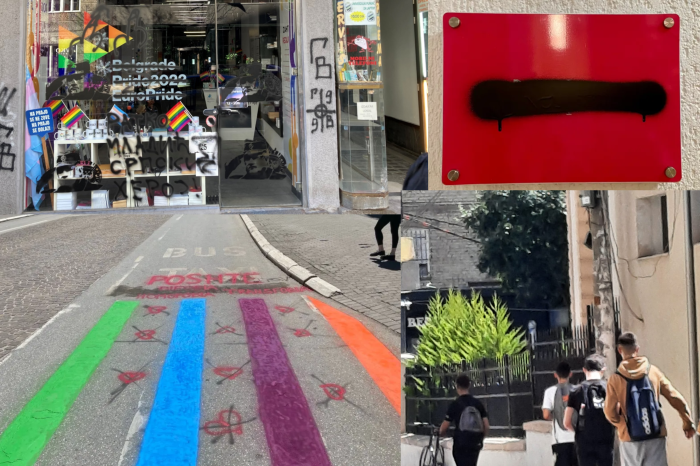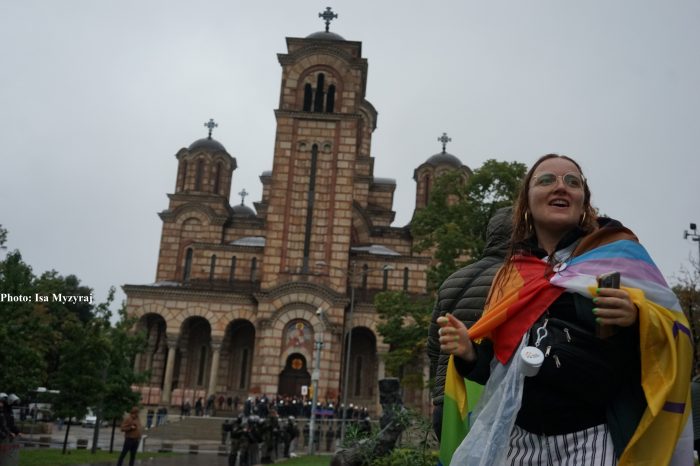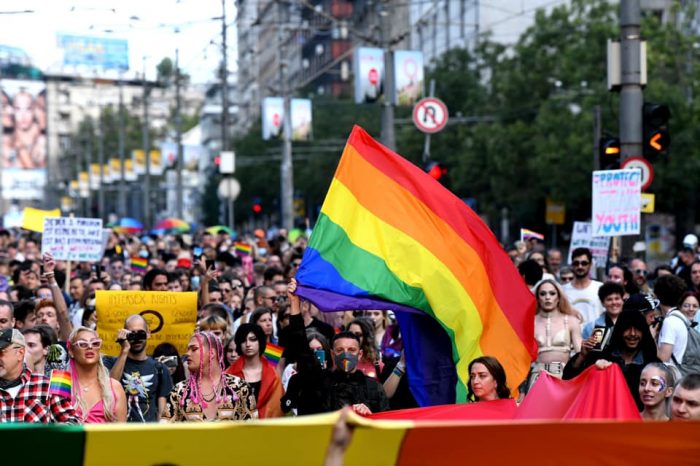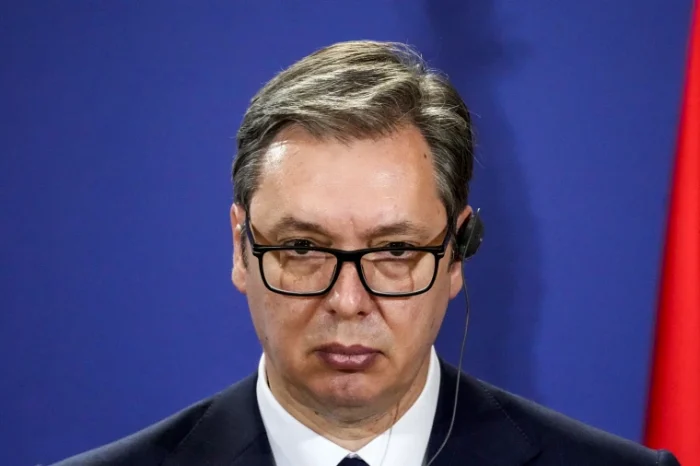EUROPRIDE në Beograd, gjithçka që duhet të dini!

Presidenti serb Aleksander Vuçiç tha se parada EuroPride që pritej të mbahej shtator në Beograd nuk do të zhvillohet. Njoftimi i presidentit serb vjen pasi mijëra njerëz marshuan në protestë kundër kësaj ngjarjeje, në fillim të këtij muaji.
Presidenti tha se nuk ishte i kënaqur me vendimin, por se Serbia duhej të përqendrohej në çështje të tjera, duke përfshirë telashet në Kosovë.
Organizatorët e paradës kanë thënë se parada do të vazhdojë gjithsesi, me çdo ndalim “të paligjshëm”.
Gjatë një konference për shtyp, Vuçiç tha se ngjarja e sivjetshme, e planifikuar të zhvillohet midis 12 dhe 18 shtatorit, do të shtyhet ose anulohet për shkak të tensioneve me Kosovën si dhe çështjeve rreth energjisë dhe ushqimit.
“Thjesht, në një moment, nuk mund të përballosh gjithçka,” tha ai. “Në një kohë tjetër, një më të lumtur ngjarja mund të zhvillohet”
Në përgjigje, organizatori i EuroPride 2022 Marko Mihailovic tha se “shteti nuk mund ta anulojë EuroPride” dhe çdo përpjekje për ta bërë këtë do të ishte një “shkelje e qartë e kushtetutës”.
Kristine Garina, presidente e Shoqatës së Organizatorëve Evropianë të Krenarisë këmbënguli se ngjarja nuk do të anulohej.
Sfondi
Ka gjithnjë e më pak kohë deri në Europride-in e parë në Evropën Juglindore, por gjithnjë e më shumë (keq)informacion në internet dhe media.
Rrjetet sociale dhe disa media po shkruajnë për anulimin e mundshëm të Pride-it, gjoja xhiron e organizuar nëpër kisha dhe manastire për pjesëmarrësit e Paradës së Krenarisë, si dhe për faktin se ata do të “përhapin linë e majmunëve”.
“Është thjesht një nivel tjetër i homofobisë në këtë vend,” thotë Stefan Šparavalo nga organizata Da se zna, i cili lufton për të drejtat e komunitetit LGBT në Serbi.
“Disa parti politike merren me këtë temë kaq intensivisht sepse besojnë se homofobia është ende një terren pjellor për të fituar vota dhe për të tërhequr vëmendjen,”- tha ai për BBC në serbisht.
Nga data 12 deri më 18 shtator, Beogradi do të presë Europride, një ngjarje ndërkombëtare kushtuar të drejtave LBGT që mbahet çdo vit në një nga qytetet e Evropës.
Organizatorët presin rreth 15 mijë të ftuar nga e gjithë Evropa, si dhe një numër të madh zyrtarësh të huaj, ndërsa përveç shëtitjes së Javës së Krenarisë do të organizohen edhe një sërë aktivitetesh.
“Si organizatorë të Europride-it në Beograd, ne komunikojmë çdo ditë me autoritetet shtetërore dhe nuk kemi asnjë ilizon se mbajtja e ngjarjes mund të vihet në dyshim në asnjë mënyrë”, thuhet në deklaratën e tyre, përcjellë nga Danas.
“Kjo është arsyeja pse ne themi – po, Europride do të mbahet në Beograd, pjesëmarrësit e tij do të jenë plotësisht të sigurt dhe ne do të dërgojmë mesazhe për rëndësinë e tolerancës dhe respektimit të të drejtave të njeriut të komunitetit LGBT+.
Ata presin dhe kërkojnë nga përfaqësuesit më të lartë të shtetit që të “heqin të gjitha dyshimet”, shtuan ata.
Rreth turneut në manastire
Në rrjetet sociale, vëmendje tërhoqi gjithashtu pretendimet se pjesëmarrësit e Europride në Beograd dhe Serbi dyshohet se do të vizitojnë “dhe përdhosin” manastiret dhe kishat.
Në grupin në Facebook “Sremski Karlovci Aktuelni” ka raportuar se vizitorët e Pride do të vizitojnë shkollën “23 Tetori”, si dhe manastiret Krušedol dhe Remeta e Madhe, të cilat gjenden në Frushka Gora, transmeton portali 021 i Novi Sadit.
Prandaj grupi në Facebook “Manastiret dhe kishat ortodokse” shpalli ndalimin për pjesëmarrësit e Paradës së Krenarisë.
Organizatorët e Paradës së Krenarisë i mohuan akuzat e këtyre grupeve.
“Aktivitetet në shkollat fillore do të kërkonin leje nga Ministria e Arsimit, kështu që këto aktivitete nuk janë të planifikuara.”
Një pjesë e turneut të tyre për të huajt përfshin një udhëtim në Sremske Karlovci të shoqëruar nga një “guidë miqësore për komunitetin LGBT+” dhe me të vërtetë përmendet një turne në manastirin e Krušedol.
Šparavalo beson se manastiret janë një “thesar kulturor i Serbisë” dhe se ato “nuk mund të shikohen ekskluzivisht si objekte fetare”.
Prandaj, siç thotë ai, nuk sheh arsye pse dikujt t’i refuzohet vizita as tek ata, as në Sremski Karlovci, të cilin ai e quan edhe “aset kulturor”.
“Kur shkoni në Paris, vizitoni Notre Dame, pavarësisht nëse keni shkuar për Gay Pride apo për një vizitë të zakonshme, siç vizitoni Hagia Sophia në Stamboll – nuk është një provokim.”
Mbi përhapjen e lisë së majmunëve
Pretendimet dhe frika për përhapjen e supozuar të lisë së majmunëve gjatë Europride po përhapen në rrjetet sociale.
Fabio Scanno, drejtor i Organizatës Botërore të Shëndetësisë (OBSH) në Serbi, tha se aktualisht “burrat që kryejnë marrëdhënie seksuale me burra janë më të cenuarit – ata përbëjnë më shumë se 90 për qind të të infektuarve”.
“Por duhet të jemi të kujdesshëm, kjo nuk është një sëmundje e popullatës LGBT+, kontakti seksual nuk është mënyra e vetme e transmetimit”, shtoi Scano.
“Mund të transmetohet përmes kontaktit të zgjatur lëkurë më lëkurë me dikë që ka simptoma, që kollitet, ekziston rreziku… Të gjithë mund të infektohen.”
Disa ekspertë bëjnë thirrje për masa të menjëhershme kundër pandemisë, duke thënë se “çdo tubim mbart disa rreziqe epidemiologjike”.
Në Ballkan, rasti i parë i infektimit u konfirmua më 24 maj në Slloveni, ndërsa në Serbi më 17 qershor.
“Rreziku epidemiologjik në rajonin evropian vlerësohet i lartë, ndërsa në rajonin afrikan i moderuar”, thane ekspertet.
Organizatorët deklarojnë se bashkëpunojnë çdo ditë me të gjitha organizatat dhe institucionet përkatëse ndërkombëtare dhe kombëtare për parandalimin e përhapjes së lisë.
Komisionerja për Mbrojtjen e Barazisë, Brankica Jankoviç, më parë dënoi lidhjen e përhapjes së lisë së majmunëve me personat LGBT+.
Rreth pagesës të Pride
Kishte gjithashtu shumë konfuzion midis personave LGBT+ në mediat sociale nëse do të duhej të paguanin për aktivitetet e Javës së Krenarisë nga xhepat e tyre.
Nga data 12 deri më 18 shtator, përveç shëtitjes nëpër rrugët e Beogradit, do të organizohen edhe një sërë ngjarjesh të tjera, si panele, ekspozita, shfaqje, koncerte dhe shfaqje filmash.
Kështu lindi dyshimi se do të tarifohet edhe hyrja në marshim.
Organizatorët e mohuan.
Ata thanë se vetëm një nga ngjarjet – një koncert i yllit të muzikës britanike Jessie Ëare në Donji Kalemegdan në Beograd – do të bëhej me pahesë për të mbuluar një pjesë të shpenzimeve të organizatës.
Mirëpo, organizatorët thonë se ata që nuk kanë para për një biletë koncerti, mund ta marrin falas në ambientet e Qendrës Informative të Krenarisë në rrugën Kralja Milana, në qendër të kryeqytetit serb.
“Të gjithë do të mund të ndjekin koncertin, pavarësisht nga të ardhurat financiare – kushdo që vjen është i mirëpritur”, thotë Šparavalo, megjithëse organizata e tij nuk merr pjesë në organizim.
Përveç kësaj, në rrjetet sociale shpesh përmendet se sa para do të ndahen për Javen e Krenarisë nga buxheti i qytetit apo republikës.
Organizatorët e mohuan pretendimin e Dverës për shpenzimet e ngjarjes së shtatorit, duke theksuar se “Shteti i Serbisë dhe Qyteti i Beogradit nuk dhanë asnjë dinar” për organizimin e Europride.
Kronologjia e të drejtave të LGBT+ në Serbi
- në vitin 2001 mbahet Parada e parë e krenarisë së personave LGBT në Beograd dhe u ndërpre për shkak të sulmeve të ekstremistëve të djathtë, huliganëve të futbollit dhe aty ishin përfaqësues të Kishës Ortodokse Serbe;
- në vitin 2004 Parada u anulua pas trazirave të marsit në Kosovë dhe djegies së xhamive në Nish dhe Beograd;
- në vitin 2009 Serbia miratoi Ligjin për Ndalimin e Diskriminimit, i cili ndalon diskriminimin ndaj personave LGBT;
- në vitin 2010 më shumë se 150 të plagosur dhe rreth 250 të arrestuar për shkak të trazirave në Beograd, të shkaktuara nga anëtarët e organizatave të krahut të djathtë në Paradë;
- në vitin 2012. U miratuan ndryshime në Kodin Penal, të cilat futën në ligj një dispozitë për krimin e urrejtjes dhe një rrethanë rënduese të detyrueshme për veprat penale të kryera për urrejtje për shkak të gjinisë, orientimit seksual ose identitetit gjinor;
- në vitin 2014 Parada e parë e Krenarisë në Beograd u mbajt pa incidente;
- në vitin 2021. Ministria për të drejtat e njeriut dhe të pakicave ka paraqitur propozimin e Ligjit për sindikatat e gjinisë së njëjtë, por pas deklaratës së presidentit të Serbisë, Aleksandar Vuçiç se nuk do ta nënshkruajë një ligj të tillë, nuk është diskutuar më./ HistoriaIme
Lazar Covs and Slobodan Maričić .BBC journalists
There is less and less time until the first Europride in Southeast Europe, but there is more and more (mis)information on the Internet and in the media about what it entails.
Social networks and some media are writing about the potential cancellation of Pride, the alleged organized tour of churches and monasteries for the participants of the Pride Parade, as well as the fact that they will “spread monkeypox”.
“It’s just another level of homophobia in this country,” says Stefan Šparavalo from the organization Da se zna, which fights for the rights of the LGBT community in Serbia.
“Certain political parties deal with this topic so intensively because they believe that homophobia is still a fertile ground to win votes and attract attention,” he told the BBC in Serbian.
From September 12 to 18, Belgrade will host Europride, an international event dedicated to LBGT rights that is held every year in one of the cities in Europe.
The organizers expect around 15,000 guests from all over Europe, as well as a large number of foreign officials, and in addition to the Pride Week walk, a series of events will be organized.
About the cancellation of Pride
Recently, information has been circulating on social networks and certain media that the Pride Parade will be cancelled.
The editor of the tabloid Informer, Dragan Vučićević, also talked about this on Pink TV.
“The gay parade in Serbia will not be held due to the current security situation in the country and that is an official decision,” said Vučićević.
However, the organizers denied it.
“As the organizers of Europride in Belgrade, we communicate with state authorities every day and we have no hint that the holding of the event can be called into question in any way,” according to their statement, reported by Danas.
“That’s why we say – yes, Europride will be held in Belgrade, its participants will be completely safe and we will send messages about the importance of tolerance and respect for the human rights of the LGBT+ community.”
They expect and ask the highest representatives of the state to “remove all doubts”, they added.
However, the top state officials have so far not explicitly said whether there will be Pride.
“I hate those who, by beating the ‘fag next to them’, beat the ‘fag in themselves’, as well as those who want to brag about something, but don’t think about what problems Serbia has and what is loaded on its neck,” he said. Vučić also emphasized that he “expresses himself poetically”.
Sparavalo believes that “prolonging uncertainty as long as possible is the manner of communication of this government.”
“We saw that at the beginning of the pandemic, when security measures were adopted, and even now when it comes to the mandate of the government, and the issue of Europride is also communicated in that manner.
“We received the last information from Vučić, who said that the competent institutions will make a decision in the coming period, but there is no indication that Pride will be banned, nor that it is being taken into account at all.”
During that time, several right-wing organizations and parties, as well as a member of the Presidency of the ruling Serbian Progressive Party (SNS), Vladimir Đukanović, called for the cancellation of Pride.
“I am asking the organizers to cancel the meeting, and if they don’t, I would ask the state to consider whether to cancel it, because it is pointless to create such tension here over a peripheral, idiotic topic,” Djukanović told Happy television.
About tours of the monastery
On social networks, attention was also drawn to allegations that Europride participants in Belgrade and Serbia will allegedly visit “and desecrate” monasteries and churches.
In the Facebook group “Sremski Karlovci Aktuelni” there were reports that visitors to Pride will visit the school “October 23”, as well as the Krušedol and Velika Remeta monasteries, which are located on Fruška Gora, Novi Sad portal 021 reports.
That is why the Facebook group “Orthodox monasteries and churches” announced the blockade of Fruška Gora for the participants of the Pride Parade, they add.
The organizers of the Pride Parade denied the allegations from those groups.
“Activities in elementary schools would require permission from the Ministry of Education, so these activities are not planned.”
Part of their tour for foreigners includes a trip to Sremske Karlovci accompanied by a “gay-friendly guide” and there is indeed a mention of a tour of the Krušedol monastery.
Happy Gay Travel did not respond to the BBC’s questions in Serbian by the time the text was published.
Šparavalo believes that monasteries are a “cultural treasure of Serbia” and that they “cannot be viewed exclusively as religious objects”.
That is why, as he says, he sees no reason why anyone should be denied a visit either to them or to Sremski Karlovci, which he also calls a “cultural asset”.
“When you go to Paris, visit Notre Dame, regardless of whether you went for Gay Pride or for an ordinary visit, like you visit the Hagia Sophia in Istanbul – it is not a provocation.”

On the spread of monkeypox
Claims and fears about the alleged spread of monkeypox during Europride are spreading on social networks.
Fabio Scanno, director of the World Health Organization (WHO) in Serbia, said that currently “men who have sex with men are the most vulnerable – they make up more than 90 percent of those infected”.
“But we should be careful, this is not a disease of the gay population, sexual contact is not the only way of transmission,” added Scano.
“It can be transmitted through prolonged skin-to-skin contact with someone who has symptoms, who coughs, there is a risk… Everyone can get infected.”about:blank
Some experts call for immediate anti-pandemic measures, stating that “every gathering carries certain epidemiological risks”.
In the Balkans, the first case of infection was confirmed on May 24 in Slovenia, and in Serbia on June 17.
“The epidemiological risk in the European region is assessed as high, and in the African region as moderate,” they stated from “Batut”.
“During the current epidemic, for the first time, deaths are being registered outside of the African continent where the disease has been endemic until now, namely two in Spain and one each in Brazil and India.”
During that time, the organizers of Pride state that the safety of the participants in every sense, including health, is of utmost importance to them.
“What worries me is that certain opponents of Europride are using it as an excuse to cancel the event.”
The organizers state that they cooperate daily with all relevant international and national organizations and institutions when it comes to preventing the spread of smallpox.
Commissioner for the Protection of Equality, Brankica Janković, previously condemned linking the spread of monkeypox with LGBT+ people.
Targeting any group of people based on any personal characteristic, including sexual orientation, is discriminatory and prohibited by law, she stated.

About payment and collection of Pride
There was also a lot of confusion among LGBT+ people on social media about whether they would have to pay for Pride Week activities out of their own pockets.
From September 12 to 18, in addition to a walk through the streets of Belgrade, a number of other events will be organized, such as panels, exhibitions, performances, concerts and film screenings.
This is how the doubt arose that the entrance to the walk will also be charged.
The organizers denied it.
They said that only one of the events – a concert by British music star Jessie Ware at Donji Kalemegdan in Belgrade – would be charged to cover part of the organization’s costs.
However, the organizers state that those who do not have money for a concert ticket can get one for free at the premises of the Pride Info Center in Kralja Milana Street, in the center of the Serbian capital.
“Everyone will be able to attend the concert, regardless of financial income – everyone who comes is welcome,” says Šparavalo, although his organization does not participate in the organization.
In addition, it is often mentioned on social networks how much money will be allocated for Pride from the city or republic budget.
The organizers denied Dvera’s claim about the costs of the September event, stressing that “the State of Serbia and the City of Belgrade did not give a single dinar” for the organization of Europride.
On violation of the Constitution
In addition to the daily calls for the cancellation of Europride, Dveri published a statement on August 13 in which it is written that they are “obliged to protect the Constitution, the Law on Public Assembly and the Law on Public Order and Peace”.
According to the movement’s claims, the Constitution and those laws are violated by “insulting public morals and all traditional values of the majority of Serbia”.
“Freedom of assembly may be limited by law only if it is necessary to protect public health, morals, rights of others or the security of the Republic of Serbia,” the Constitution reads.
The first attempt to organize the Pride Parade in 2001 in Belgrade was interrupted by scenes of fierce violence, which also occurred in 2010, during the second attempt to organize Pride.
In the following years, the Parade was canceled for security reasons, and since 2014 it has been held every year, except when the corona virus epidemic prevented it.
Sparvalo calls claims that Pride violates public morals “very tendentious untruths to discredit the fight for LGBT+ rights”.
“This assembly actually uses the constitutional right and there is no way to violate public morality,” says Šparavalo.
“It is a rally to support one of the most vulnerable groups of people in Serbia, which is not only said by LGBT+ organizations, but also by independent state institutions, such as the ombudsman and the commissioner for the protection of equality.”
In a recent report by the “To be known” organization, it is stated that during 2021, the number of attacks on LGBT+ persons increased by 40 percent compared to the previous year.
“We’ve never seen anyone consider it a violation of public morality when men take off their clothes at the Gucci Trumpet Festival or the Beer Fest,” says Sparavalo.
Chronology of LGBT+ rights in Serbia
- in 2001 The first pride parade of LGBT people in Belgrade was interrupted due to attacks by extreme right-wingers, football hooligans, and there were representatives of the Serbian Orthodox Church;
- in 2004 The parade was canceled after the March riots in Kosovo and the burning of mosques in Niš and Belgrade;
- in 2009 Serbia passed the Law on Prohibition of Discrimination, which prohibits discrimination against LGBT persons;
- in 2010 More than 150 injured and around 250 detained due to riots in Belgrade, caused by members of right-wing organizations at the Parade;
- in 2012. Amendments to the Criminal Code were adopted, which introduced into the law a provision on hate crime and a mandatory aggravating circumstance for criminal acts committed out of hatred due to gender, sexual orientation or gender identity;
- in 2014 The first Pride Parade in Belgrade was held without incident;
- in 2021. The Ministry of Human and Minority Rights presented the proposal of the Law on Same-Sex Unions, but after the statement of the President of Serbia, Aleksandar Vučić, that he would not sign such a law, it was no longer discussed.











